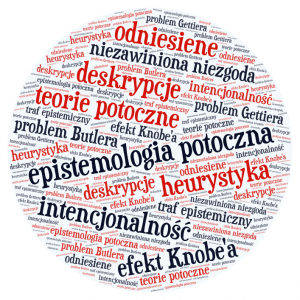Seminarium poświęcone jest zagadnieniom badanym w ramach eksperymentalnej filozofii umysłu.
Prowadzący: Katarzyna Kuś, Adrian Ziółkowski
BLOK I: Świadomość fenomenalna
- Knobe, J., Prinz, J. (2008). Intuitions about consciousness. Experimental studies. Phenomenology and the Cognitive Sciences, 7, 67-83.
- Sytsma, J. M., Machery, E. (2009). How to study folk intuitions about phenomenal consciousness. Philosophical Psychology, 22(1), 21-35.
- Sytsma, J., Machery, E. (2010). Two conceptions of subjective experience. Philosophical Studies, 151, 299-327.
- Phelan, M., Arico, A., Nichols, S. (2013). Thinking things and feeling things. On an alleged discontinuity in folk metaphysics of mind. Phenomenology and the Cognitive Sciences, 12, 703-725.
- Strickland, Brent Suben, Aysu (2012). Experimenter Philosophy. The Problem of Experimenter Bias in Experimental Philosophy. Review of Philosophy and Psychology 3(3). 457-467.
- Sytsma, J., Ozdemir, E. (2019). No problem. Evidence that the concept of phenomenal consciousness is not widespread. Journal of Consciousness Studies, 26(9-10), 241-256.
BLOK II: Problem luki eksplanacyjnej
- Brian Fiala, Adam Arico i Shaun Nichols (2012). On the psychological origins of dualism. Dual-process cognition and the explanatory gap. W: Creating consilience. Integrating science and the humanities (2012), s. 88-110.
- Eugen Fischer i Justin Sytsma (2021). Zombie intuitions, Cognition 215, 1-12.
BLOK III: Potoczne pojęcie bólu
- Reuter, K. (2011). Distinguishing the appearance from the reality of pain. Journal of Consciousness Studies, 18(9-10), 94-109.
- Reuter, K., Sytsma, J. (2020). Unfelt pain. Synthese, 197(4), 1777-1801.
- Kim, H. E., Poth, N., Reuter, K., Sytsma, J. (2016). Where is your pain? A cross-cultural comparison of the concept of pain in Americans and South Koreans. Studia Philosophica Estonia, 9(1), 136-169.
BLOK IV: Potoczne teoria percepcji i postrzegania kolorów
- Cohen, J., and Nichols, S. (2010). Colours, colour relationalism and the deliverances of introspection. Analysis, 70(2), 218–228.
- Roberts, P., Andow, J., Schmidtke, K. (2014). Colour relationalism and the real deliverances of introspection. Erkenntnis, 79(5), 1173–89.
- Allen, K., Quinlan, P., Andow, J., Fischer, E. (2022). What is it like to be colour‐blind. A case study in experimental philosophy of experience. Mind Language, 37(5), 814-839.
- Fischer, E., Allen, K. Engelhardt, P.E. (2023) Fragmented and conflicted. Folk beliefs about vision. Synthese 201, 84.
BLOK V: Potoczne teorie pamięci i emocji
- Díaz, R., Reuter, K. (2021). Feeling the right way. Normative influences on peoples use of emotion concepts. Mind Language, 36(3), 451-470.
- Díaz, R. (2022). Emotions and the body. Testing the subtraction argument. Philosophical Psychology 35 (1), 47-65.
- Dranseika, V. (2020). False memories and quasi-memories. Oxford Studies in Experimental Philosophy Volume 3, 3, 175-188.
- Dranseika, V., McCarroll, C. J., Michaelian, K. (2021). Are observer memories (accurate) memories. Insights from experimental philosophy. Consciousness and Cognition, 96, 103240.

